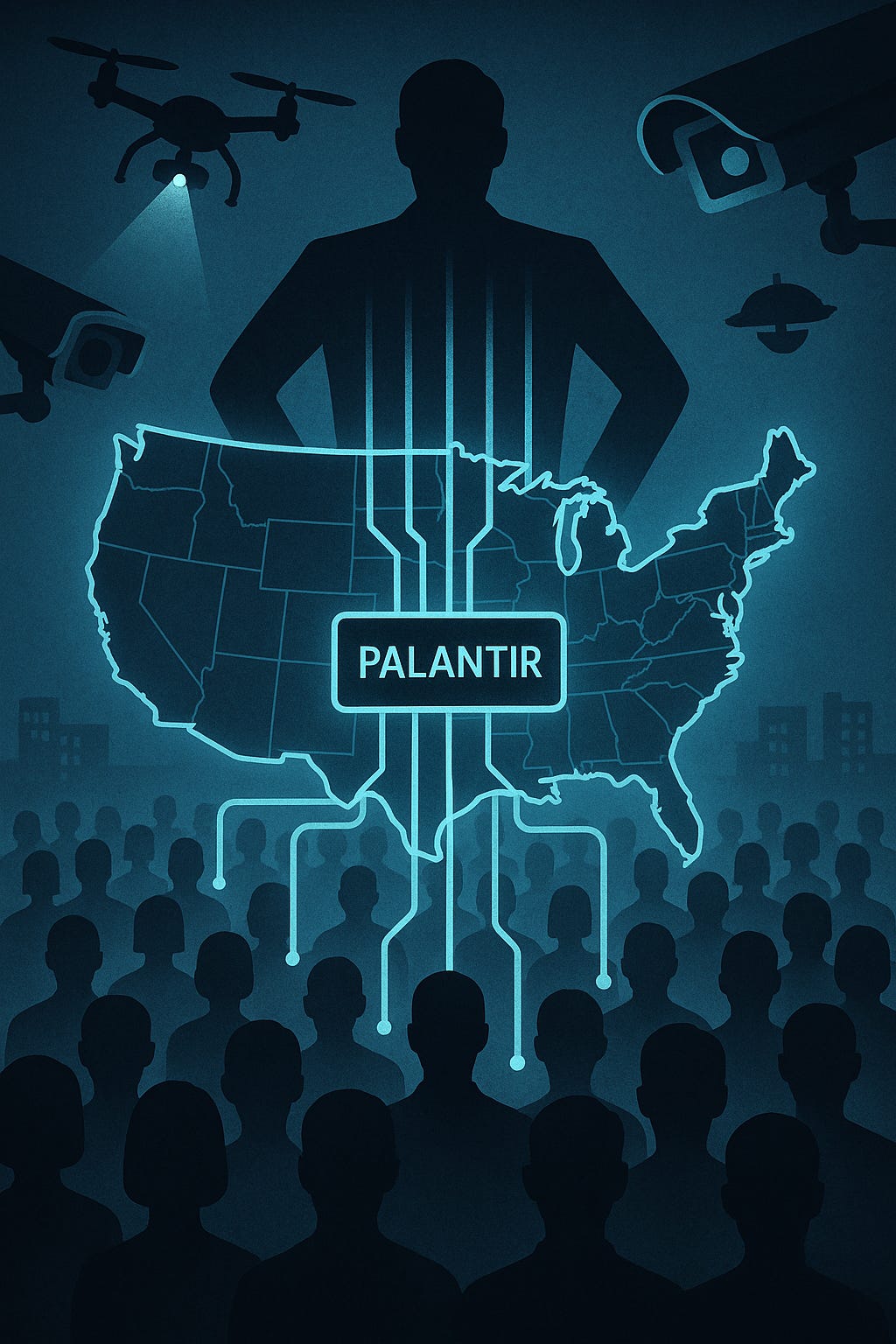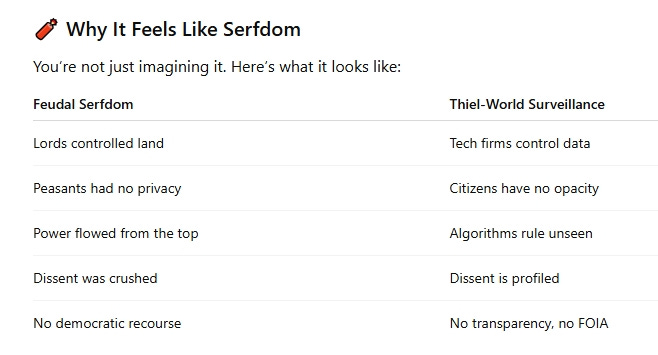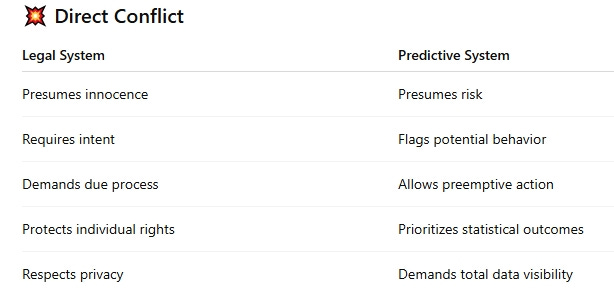I Am Not a Pattern: The Quiet Rise of Surveillance and the Death of Innocence
They’re building a database of you and me, and bro, we are sus af
The Trump administration has quietly inked a deal with Palantir Technologies to build what amounts to a master database of American citizens, a centralized digital hub that aggregates data from the IRS, Social Security Administration, Homeland Security, and other agencies.
The stated goal? “Efficiency.”
The real outcome? A private surveillance contractor with deep ideological ties to the administration is being handed the infrastructure to map, track, and analyze the lives of over 330 million people, without consent, transparency, or oversight.
Palantir’s tools have already been used in immigration raids, battlefield surveillance, and predictive policing. Now, they’re being handed the digital skeleton of the American population.
And here’s the part that should keep you up at night: The U.S. has no federal data privacy law. None. Zero. Zilch.
There is no unified legal framework governing how your information is used, how long it’s stored, who can access it, or what recourse you have when it’s abused. In this legal vacuum, we are witnessing a private company with a surveillance pedigree develop the architecture for a future where suspicion is automated and freedom is conditional.
We just hit 14,000 subscribers—thank you!
Get exclusive access for just $1/week or $52 a year.
Get exclusive analysis and fearless reporting you won’t find in corporate media.
No time? We got you! TL;DR:
The Trump administration has partnered with Palantir, a private surveillance technology company, to build a centralized national database of American citizens, combining data from the IRS, Social Security, DHS, and other sources.
Palantir was co-founded by Peter Thiel, who has openly criticized democracy and backed far-right political movements. Its software has been used in predictive policing, deportations, and military operations.
The U.S. has no federal privacy law and no FOIA protections when private contractors, such as Palantir, operate public data systems. That means no transparency, no accountability, and no way to challenge misuse.
This isn't about efficiency. It's about building a digital infrastructure of control, quietly and permanently.
You are not a pattern. You are a person. And it's time to act before an algorithm rewrites your rights.
📞 Call your reps.
🛡️ Support digital rights orgs.
🔦 Demand a real national privacy law before it's too late.
Belgium Is a Bicycle. We Are a Freight Train.
Defenders of this new data initiative will inevitably point to places like Belgium as a model, a small European country with a centralized citizen data system that links ID cards to public services, tax filings, healthcare, and more. In Belgium, it works.
But let’s be clear: Belgium is a test case, not a template. And importing that model into the U.S. isn’t just risky; it’s structurally irresponsible.
Belgium has about 11.8 million citizens. The United States, meanwhile, has over 330 million. That’s a population nearly 28 times larger, with an equally exponential increase in agency complexity, legal jurisdictions, and logistical chaos.
Belgium operates under the GDPR, one of the world's strongest digital privacy frameworks. Citizens have the right to know who accesses their data, to request corrections, and to challenge misuse.
The U.S. has... nothing—no federal privacy law, no data access guarantees, and no consistent oversight.
And that’s before we even talk about structure. Belgium is a unitary parliamentary democracy. The U.S. is a federalist patchwork of 50 states, 19,000+ local governments, and dozens of federal agencies that all operate under competing laws, priorities, and data practices.
Centralizing that without universal legal protections is not modernization. It’s madness.
Trying to scale Belgium’s system to the U.S. is like copying a village’s plumbing system to run a mega-metropolis and skipping the safety valves.
When Your Data Firm’s Founder Thinks Democracy Doesn’t Work
The US is not Belgium, and Palantir isn’t just a tech company. It’s the ideological and operational vehicle of Peter Thiel, a billionaire who has repeatedly expressed contempt for democracy and openly supported authoritarian and technocratic rule.
“I no longer believe that freedom and democracy are compatible.”
—Peter Thiel, 2009
Thiel has poured hundreds of millions of dollars into reshaping American politics, from bankrolling far-right Senate candidates to advising Trump’s transition team. But it’s not just his money that’s influential. It’s his infrastructure. Palantir, the company he co-founded, has built the digital backbone for U.S. surveillance operations, including counterterrorism, predictive policing, battlefield intelligence, and ICE deportations.
We’ve talked about Thiel and his dangerous ideas before. See our reporting here:
Note: These articles is more than 45 days old and now lives in our archive. Consider becoming a paid subscriber for the full 600+ article archive, exclusive content, and occasional early access.
Now it’s being given control of your government’s data.
Palantir’s current CEO, Alex Karp, hasn’t exactly distanced the company from its origins. In fact, he’s leaned in, praising the Department of Government Efficiency (DOGE) for slashing civil services and celebrating disruption as patriotic. He has also taken swipes at “soft” democracies like those in Europe for being too cautious about AI and data policy.
The company isn’t just ideologically aligned. It’s financially incentivized to entrench itself. Once Palantir builds this system, it can’t be easily removed. This is a privatized intelligence apparatus that will become indispensable, not because it’s benevolent, but because it will be too big to fail.
This isn’t innovation. This is infiltration.
Why would someone who thinks democracy is broken want to design the infrastructure that governs it? Because power isn’t about elections. It’s about access. And Palantir now has access to everything.
Digital Serfdom in a Technocratic Kingdom
Peter Thiel doesn’t hide his vision for society. He has said that democracy and capitalism are incompatible. He funds candidates and projects aimed at weakening collective power and entrenching elite control. But instead of retreating to a private island or crypto-fortress, he’s wiring the mainland and dragging the rest of us into his experiment.
This isn’t governance. It’s governance-as-a-service, where you and your neighbors are no longer citizens. You’re data points.
In feudal times, serfs worked land owned by a lord. Today, we generate data mined by companies like Palantir. We don't own our information. We don’t know where it goes, how it’s used, or whether it will be weaponized against us.
What Thiel and Palantir are building isn’t just a database. It’s a digital caste system:
Those who control the algorithms govern.
Those who are scored by them obey.
There are no elections, no appeals, no accountability, just access, secrecy, and permanent asymmetry.
Instead of forming his utopia on a private island, he’s wiring the mainland to make us all serfs.
In this vision, freedom is redefined as compliance. And power doesn’t flow from the people. It originates from proprietary code, which is privately held.
Innocent Until Algorithm Says Otherwise
Palantir’s historical focus on surveillance and predictive policing is antithetical to our system of justice. The cornerstone of American justice is simple: you are innocent until proven guilty. The burden of proof lies with the state. You cannot be punished for thoughts, associations, or potential actions, only for crimes committed and proven in a court of law.
But predictive policing flips that entirely.
These systems don't wait for a crime. They analyze your data—what you search, where you go, who you know—and assign risk. The red flags don’t come from evidence. They come from patterns that resemble what the system thinks a “bad actor” looks like.
That’s not justice. That’s statistical profiling.
And once you're flagged, everything you do looks suspicious. Garden tools become weapons. Maps become targets. Books become manifestos. Your humanity becomes a potential liability in a system that doesn't see people, only probabilities.
When you’re looking for a criminal, everything looks like a crime scene.
The legal system is supposed to presume innocence. Predictive policing is built to presume risk. That shift, quiet and data-driven, fundamentally erodes one of the last guardrails between freedom and authoritarianism.
I Am Not a Pattern. I’m a Person.
This is personal.
I garden. So yes, I buy fertilizer. I also buy bug spray, and I look up how to get rid of invasive species. I forage, so I read about edible and poisonous plants. A friend of mine is living off the grid, and I’ve researched venomous animals and wilderness safety.
I’m fascinated by true crime, not because I admire it, but because I can’t wrap my head around what drives people to do horrific things. I read Holocaust literature because I want to understand how ordinary people let evil scale. I’m obsessed with Tsarist Russia because it was an empire in slow collapse, and I’m an American watching the seams of my own nation fray.
I write about U.S. politics. I research a wide range of topics, including immigration policy, protest movements, and internet subcultures.
To an algorithm trained to see risk, I’m a mess. I’m poison, politics, preppers, and profiling triggers. I’m a digital cocktail of red flags.
But I’m not a threat. I’m just a human being trying to understand the world.
If an algorithm judged me by my search history, it would see risk, but all it would find is someone trying to understand the world and survive it.
That’s the terrifying truth of this Palantir-driven future. In their system, curiosity is correlation, and correlation is risk.
When you're building an architecture of suspicion, everything starts to look suspect.
And for people like me—librarians, journalists, students, creators—that means our work becomes dangerous, not because it is, but because it looks that way to a system designed to flag, not understand.
No FOIA, No Transparency
When government agencies run programs, the Freedom of Information Act (FOIA) provides the public with a legal means to request answers.
However, when private contractors like Palantir run those programs, FOIA often doesn’t apply. That means we can’t see how our data is being used, who it’s being shared with, or how decisions are made. There’s no sunlight, no audit trail, and no accountability.
This system isn’t just centralized. It’s opaque by design.
This Isn’t Just Code. It’s a Constitutional Crisis.
The United States is handing the most sensitive information of hundreds of millions of people to a private company with deep surveillance roots, far-right ideological leanings, and no meaningful public accountability.
There is no comprehensive national privacy law in the United States.
There is no oversight agency checking Palantir’s algorithms.
There is no recourse if you're wrongly flagged, profiled, or investigated.
This is not efficiency. This is not innovation. This is the infrastructure for control, built quietly, outsourced strategically, and justified with buzzwords. This is authoritarianism.
It’s time to speak up. Loudly.
Call Your Elected Officials
📞 Dial the U.S. Capitol Switchboard: (202) 224-3121
Ask to be connected to your House Representative and Senators.
Script you can use:
"Hi, my name is [Your Name], and I’m a constituent from [Your City/Zip Code]. I’m calling to demand Congressional action to protect Americans' digital privacy and civil liberties.
I’m deeply alarmed by the federal government’s partnership with Palantir to create a centralized citizen data system. This kind of mass data consolidation, especially with no national privacy law, is a threat to constitutional rights.
I urge [Representative/Senator] to support comprehensive federal data privacy legislation, increase oversight of government tech contracts, and ensure no private company can operate a surveillance infrastructure without public transparency."
Support These Groups Doing the Work
Electronic Frontier Foundation (EFF) – Digital rights, privacy, and surveillance watchdogs.
EPIC (Electronic Privacy Information Center) – Legal advocacy and policy watchdog.
Access Now – Global advocacy for digital civil rights.
Just Futures Law – Legal support for immigrant communities targeted by tech surveillance.
Fight for the Future – Tech justice and grassroots organizing.
Final Thought
You should not need a law degree, a VPN, or a burner phone to feel safe being curious, political, or different in your own country.
We don’t need to accept surveillance as the cost of living.
We are not patterns. We are people. And we still have a voice.
Let’s use it before the system is built to make sure we can’t.
We just hit 14,000 subscribers—thank you!
Get exclusive access for just $1/week or $52 a year.
Get exclusive analysis and fearless reporting you won’t find in corporate media.
Bibliography:
"Palantir to Create Vast Federal Data Platform Tying Together Millions of Americans' Private Records, Stock Jumps." The Economic Times, June 2, 2025.
Sweetser, Kyle. "Sweetser Slams Trump Admin’s Compilation of Americans’ Data." Alabama Political Reporter, June 2, 2025.
Thiel, Peter. "The Education of a Libertarian." Cato Unbound, April 13, 2009.
"Peter Thiel Is Taking a Break From Democracy." The Atlantic, November 2023.
"Peter Thiel o el Reaccionarismo Tecnológico." El País, May 30, 2025.
Karp, Alex. "Q1 2025 Letter to Shareholders." Palantir Technologies, May 2025.
"Alex Karp, Co-Founder, CEO & Director, Palantir, 5/22/2025." YouTube, May 22, 2025.
"Palantir's Surveillance Empire: A Story of American Policing, Patriotism, and Profit." ResearchGate, 2021.
"The Police State, Powered by Palantir." Truthdig, May 2025.
"Palantir, Data-Mining Company That Helped ICE Track Down and Deport Immigrants, Is Going Public." Salon, July 8, 2020.
"Palantir to Create Vast Federal Data Platform Tying Together Millions of Americans' Private Records, Stock Jumps." The Economic Times, June 2, 2025.
Eby, Michael. "Palantir’s Idea of Peace." The Nation, May 27, 2025.
"Palantir Granted $30 Million to Build 'ImmigrationOS' Surveillance Platform for ICE." Immigration Policy Tracking Project, April 2025.
"Palantir Started By Spying on a City Now Sells AI for War." AIM Research, April 2025.
"Palantir Technologies." Wikipedia. Accessed June 2, 2025.













“I no longer believe that freedom and democracy are compatible,” said Peter Thiel. He continued: “So the US shall henceforth have neither.”
This! Constitutional Crisis right here! This is happening without our knowledge nor consent and our information is being given to a right wing private entity! Thievery of our personal information for right wing surveillance and control! 1984 here we come. ALARMING! Thank for writing this important article.